
Sir Barry Alan Crompton Gibb is a British musician, singer, songwriter and record producer. He rose to worldwide fame as a member of the Bee Gees, one of the most commercially successful and influential groups in the history of popular music. With his younger brothers, fraternal twins Robin and Maurice Gibb, he formed a musical partnership beginning in 1955. He has lived in Britain, Australia, and the United States, holding dual UK–US citizenship since 2009.
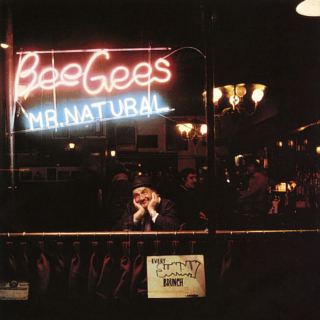
Mr. Natural is the Bee Gees' twelfth album, released in May 1974. It was the first Bee Gees release produced by Arif Mardin, who was partially responsible for launching the group's later major success with the follow-up album Main Course. The album's rhythm and blues, soul, funk and hard rock sounds initiated the group's reinvention as a disco and blue-eyed soul act, which would solidify on subsequent albums. However, Barry Gibb has said that the album was "whiter" than Main Course. The cover photograph was taken at 334 West 4th Street, Greenwich Village, New York City by Frank Moscati, which is today known as The Corner Bistro tavern.

"Night Fever" is a song written and performed by the Bee Gees. It first appeared on the soundtrack to Saturday Night Fever on RSO Records. Producer Robert Stigwood wanted to call the film Saturday Night, but singer Robin Gibb expressed hesitation at the title. Stigwood liked the title Night Fever but was wary of marketing a movie with that name. The song bounded up the Billboard charts while the Bee Gees’ two previous hits from Saturday Night Fever soundtrack were still in the top ten. The record debuted on the Billboard Hot 100 Chart at #76, then leaped up 44 positions to #32. It then moved: 32–17–8–5–2–1. It remained at #1 for eight weeks, and ultimately spent 13 weeks in the top 10. For the first five weeks that "Night Fever" was at #1, "Stayin' Alive" was at #2. Also, for one week in March, Bee Gees related songs held five of the top positions on the Hot 100 chart, and more impressively, four of the top five positions, with "Night Fever" at the top of the list. The B-side of "Night Fever" was a live version of "Down the Road" taken from the Bee Gees 1977 album, Here at Last... Bee Gees... Live.

"Jive Talkin' " is a song by the Bee Gees, released as a single in May 1975 by RSO Records. This was the lead single from the album Main Course and hit number one on the Billboard Hot 100; it also reached the top-five on the UK Singles Chart in the middle of 1975. Largely recognised as the group's comeback song, it was their first US top-10 hit since "How Can You Mend a Broken Heart" (1971).
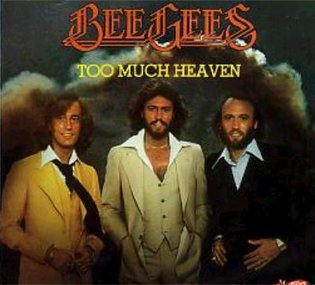
"Too Much Heaven" is a song by the Bee Gees, which was the band's contribution to the "Music for UNICEF" fund. They performed it at the Music for UNICEF Concert on 9 January 1979. The song later found its way to the group's thirteenth original album, Spirits Having Flown. It hit No. 1 in both the US and Canada. In the United States, the song was the first single out of three from the album to interrupt a song's stay at #1. "Too Much Heaven" knocked "Le Freak" off the top spot for two weeks before "Le Freak" returned to #1 again. "Too Much Heaven" also rose to the top three in the UK. In the US, it would become the fourth of six consecutive No. 1s, equalling the record set by Bing Crosby, Elvis Presley, and the Beatles for the most consecutive No. 1 songs. The six Bee Gee songs are "How Deep Is Your Love", "Stayin' Alive", "Night Fever", "Too Much Heaven", "Tragedy" and "Love You Inside Out". The songs spanned the years of 1977, 1978 and 1979.
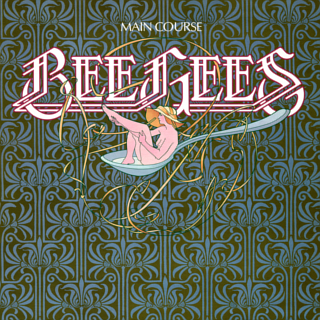
Main Course, released in 1975 for the RSO Records label, is the 13th album by the Bee Gees, and their last album to be released by Atlantic Records in the US under its distribution deal with Robert Stigwood. This album marked a great change for the Bee Gees as it was their first album to include mostly R&B, soul and funk-influenced songs, and created the model for their output through the rest of the 1970s. It rejuvenated the group's career and public image, particularly in the US, after the commercial disappointment of their preceding few albums. It was the group's thirteenth album. Main Course was the first album to feature keyboardist Blue Weaver. The album cover with the band's new logo designed by US artist Drew Struzan made its first appearance here.

"Love You Inside Out" is a 1979 hit single by the Bee Gees from their album, Spirits Having Flown. It was their last chart-topping on the Billboard Hot 100, interrupting Donna Summer's "Hot Stuff", becoming the third single from the album to do so. In the UK, the single peaked at No. 13 for two weeks. It was the ninth and final number-one hit for the Bee Gees in the US, and the twelfth and final number-one hit in Canada as well. The trio would not return to the top 10 for ten years, with the song, "One".
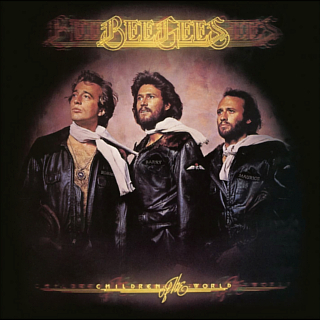
Children of the World is a 1976 album by the Bee Gees. The first single, "You Should Be Dancing", went to No. 1 in the US and Canada, and was a top ten hit in numerous other territories. It was the group's fourteenth album. The album was re-issued on CD by Reprise Records and Rhino Records in 2006. This was the first record featuring the Gibb-Galuten-Richardson production team which would have many successful collaborations in the following years.

"You Should Be Dancing" is a song by the Bee Gees, from the album Children of the World, released in 1976. It hit No. 1 for one week on the American Billboard Hot 100, No. 1 for seven weeks on the US Hot Dance Club Play chart, and in September the same year, reached No. 5 on the UK Singles Chart. The song also peaked at No. 4 on the Billboard Soul chart. It was this song that first launched the Bee Gees into disco. It was also the only track from the group to top the dance chart.

"You Win Again" is a song written by Barry, Robin and Maurice Gibb and performed by the Bee Gees. The song was produced by the brothers, Arif Mardin and Brian Tench. It was released as the first single on 7 September 1987 by Warner Records, from their seventeenth studio album E.S.P. (1987). It was also their first single released from the record label. The song marked the start of the group's comeback, becoming a No. 1 hit in many European countries, including topping the UK Singles Chart—their first to do so in over eight years—and making them the first group to score a UK No. 1 hit in each of three decades: the 1960s, 1970s, and 1980s.

"How Deep Is Your Love" is a pop ballad written and recorded by the Bee Gees in 1977 and released as a single in September of that year. It was ultimately used as part of the soundtrack to the film Saturday Night Fever. It was a number-three hit in the United Kingdom and Australia. In the United States, it topped the Billboard Hot 100 on 25 December 1977 and stayed in the Top 10 for 17 weeks. It spent six weeks atop the US adult contemporary chart. It is listed at No. 27 on Billboard's All Time Top 100. Alongside "Stayin' Alive" and "Night Fever", it is one of the group's three tracks on the list. The song was covered by Take That for their 1996 Greatest Hits album, reaching No. 1 on the UK Singles Chart for three weeks.
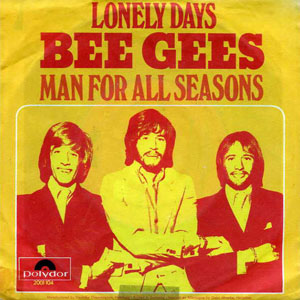
"Lonely Days" is a ballad written and performed by the Bee Gees. It appeared on their album 2 Years On, and was released as a single, becoming their first Top Five hit in the US, peaking at number three in the Billboard Hot 100 and reaching number one in the Cashbox and Record World charts. Barry Gibb later re-recorded the song with country quartet Little Big Town for his 2021 album Greenfields.

"Paying the Price of Love" is the first single from the Bee Gees' 20th studio album, Size Isn't Everything (1993). The song reached the top 10 in Belgium and Portugal and the top 40 in Austria, Germany, the Netherlands, Switzerland, and the United Kingdom. In the United States, it charted on the Billboard Hot 100, reaching number 74, and peaked within the top 30 on the Billboard Adult Contemporary chart. The promotional video for the song shows the brothers performing the song as holograms on a futuristic version of MTV.
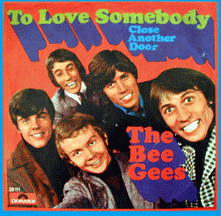
"To Love Somebody" is a song written by Barry and Robin Gibb. Produced by Robert Stigwood, it was the second single released by the Bee Gees from their international debut album, Bee Gees 1st, in 1967. The single reached No. 17 in the United States and No. 41 in the United Kingdom. The song's B-side was "Close Another Door". The single was reissued in 1980 on RSO Records with "How Can You Mend a Broken Heart" as its flipside. The song ranked at number 94 on NME magazine's "100 Best Tracks of the Sixties". It was a minor hit in the UK and France. It reached the top 20 in the US. It reached the top 10 in Canada.
"Edge of the Universe" is a rock song by the Bee Gees, written by Barry and Robin Gibb from the album Main Course released in 1975, and also released as a B-side of "Nights on Broadway".

"Mr. Natural" is a song by the Bee Gees, written by Barry and Robin Gibb. On 29 March 1974, it was released as a single and also released on the album of the same name in 1974. It was backed with a folk rock number "It Doesn't Matter Much to Me". The group's first single which was produced by Arif Mardin.

"Run to Me" is a song by the Bee Gees, the lead single and first track on the group's album To Whom It May Concern (1972). The song reached the UK Top 10 and the US Top 20.
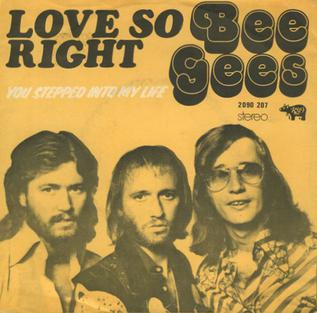
"Love So Right" is an R&B ballad recorded by the Bee Gees. It was the second single released on the album Children of the World.

"Fanny (Be Tender with My Love)" is a song written and performed by the Bee Gees for their Main Course album in 1975. It was the third single release from the album, peaking at number 12 on the United States Billboard Hot 100 chart and number two in Canada. According to Maurice Gibb, producer Quincy Jones called "Fanny" one of his favorite R&B songs of all time.

"Crazy for Your Love" is a song by pop music group Bee Gees, which was released in 1988 as the third single from their seventeenth studio album E.S.P. (1987). The song was written by Barry Gibb, Robin Gibb and Maurice Gibb, and produced by Arif Mardin and the Bee Gees, with co-production by Brian Tench. "Crazy for Your Love" peaked at No. 79 in the UK Singles Chart and remained in the Top 100 for two weeks.


















